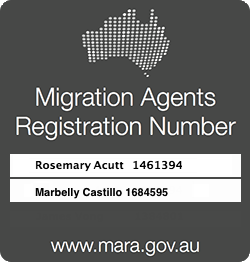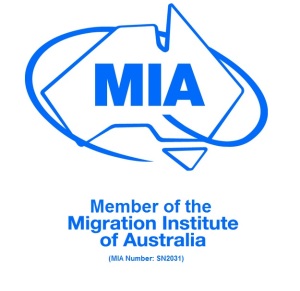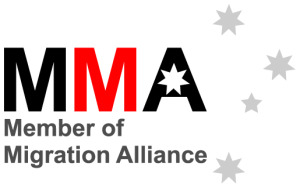Frequently Asked Questions
How long does it take for my visa to be granted?
It is difficult to provide you with a specific processing time as it all depends on the type of visa and the processing location. In general, visas which are for a longer period of stay will take longer to process whereas visitor visas or student visas would take on average not more than 3 months for the decision to be made.
Can I travel on a bridging visa?
Depending on the class of the bridging visa you are holding you may be able to travel provided that you make an application for a bridging visa B. This bridging visa will generally allow you to travel overseas for up to 3 months unless you have exceptional circumstances which warrant for a longer period. You must ensure to check your bridging visa and conditions attached prior to making the decision to travel.
I am on a bridging visa and I just got my visa refused, can I lodge a new application?
Unfortunately, you are barred by Section 48 of the Migrations Act to make any further applications whilst onshore. However, you are permitted to lodge new applications offshore and await for the decision to be made. This possibility is subject to any further restrictions which may be imposed in your decision such as if you did not satisfy the Public Interest Criterion 4020.
Can I lodge an Application for review of the decision at the Migration Review Tribunal?
Yes – provided that you have lodged the application within 21 days from the date of the decision by the Department of Immigration. If your visa has been cancelled you must lodge your application within 7 working days from the date of the cancellation.
My bridging visa does not permit me to work, is there any way of having the ‘no work’ condition removed?
Yes – provided that you can establish financial hardship. You would require to show substantial supporting documentation to the Department justifying that you have a compelling need to work.
Can I add my family on my visa application?
Provided that you have declared that you are married in your application when you initially applied, there should not be any issue with adding your family to your application subsequently.
My partner and I have not been living together for 12 months, can we still lodge Partner visa?
Generally, to sufficiently meet the de facto criteria you are required to live together for a period of 12 months prior to the application. However, if you register your de facto relationship and have substantial reasons as to why you did not live together, it may still be feasible to apply.
The Migration Review Tribunal has made an unfavourable decision, what are my options now?
Depending on the decision and your circumstances, you may be able to appeal the decision at the Federal Circuit Court. Alternatively, you may have the option to request for Ministerial Intervention.
Key Terminology Explained
ANZSCO
Not sure how to correctly classify your occupation for migration purposes? The Department relies on the Australian and New Zealand Standard Classification of Occupations (Second Edition) published by the Australian Bureau of Statistics. ANZSCO is available online by clicking here.
Assurance of Support
An Assurance of Support is a commitment to support an applicant and their family so that the applicant will not have to rely on any forms of government support. In some circumstances, a bond may be required to be paid by the Assurer.
Australian Study Requirement
To meet the Australian study requirement you must have completed in no less than 16 calendar months (92 weeks) either a single qualification or more than one qualification resulting in a total period of at least two academic years of study.
The Department will use CRICOS to determine whether your course meets the Australian study requirement. A course that has a registered duration of 92 weeks is considered to meet the two academic years requirement.
In order to meet the Australian study requirement, each qualification must meet the following requirements:
1. Be either a degree, diploma, advanced diploma or trade qualification
2. Have been undertaken at an Australian educational institution in Australia
3. Have been conducted in English
4. Be registered on CRICOS.
Bridging Visa
A Bridging visa is a temporary visa which allows a person to remain lawfully in Australia for a period of time. Depending on your circumstances, a Bridging Visa may have full rights to work and study, or only limited rights to remain in Australia for a short period (for example, pending departure from Australia).
Certified Copy
A photocopy of a document notarized or stamped as being a true copy of the original by a legally authorised person or agency. In Australia, this means a copy which is marked as a true copy by a person before whom a Statuatory Declaration may be made. Such authorised persons include the following: magistrate, Justice of the Peace, Commissioner for Affidavits, solicitor, registered medical practitioner, bank manager, postal manager, an Australian Public Service Officer with 5 years or more service. The department also accepts documents certified by a registered migration agent.
Civil Union
A civil union, also referred to as a civil partnership, is a legally recognised form of partnership similar to marriage. The civil union is open to same-sex couples as a way of formally registering their relationship. Further information can be found at the Registry of Births, Deaths and Marriages for your State or Territory of residence.
Competent English
Competent English can be demonstrated by showing:
1. An IELTS result with a minimum score of 6 in each of the four bands (see below);
2. An OET result with a minimum scored of ‘B’ in each of the four components; or
3. A passport from the United Kingdom, the United States of America, Canada, New Zealand or the Republic of Ireland.
CSOL
The Consolidated Sponsored Occupation List or CSOL for short is a single list of occupations which are eligible for migration under the following visa categories:
* State or Territory Government nominated visas (such as subclasses 190 and 489)
* Direct entry stream Employer Nomination Scheme visa
* Temporary Work (Skilled) visa (subclass 457)
* Training and Research Visa (Subclass 402)
Date of Completion
Your Australian Qualification is taken to be completed (“the date of completion”) on the first date in which your tertiary institution publicly notifies you that you have met the requirements for the award. You may receive notification by letter, on the internet, by publication in a newspaper, by e-email, or other means. It is not the date of conferral of your award. The date of conferral is the date that you actually receive your degree.
De Facto Relationship
A person is in a de facto relationship with another person if they are in a genuine and continuing relationship with a mutual commitment to a shared life to the exclusion of all others. The couple must live together or have been living together and now reside separately on a non-permanent basis; and have been living together for a ‘reasonable’ period of time. For Partner visa applications and any permanent residency applications, applicants must have been living together for at least 12 months immediately prior to lodgement of an application. Other temporary visa applications only require that applicants have been living together for at least 6 months.
Dependent
A person who is wholly or substantially reliant on a family member for financial support to meet their basic needs of food, shelter and clothing; or wholly or substantially reliant on their family member for financial support due to being incapacitated for work because of the total or partial loss of bodily or mental functions.
Dependent Child
A child or step-child who has not turned 18 years of age, or, if aged 18 years or over, is a dependant. A dependent child must not have a spouse or de facto partner, or be engaged to be married.
Eligible New Zealand Citizen
An ‘eligible New Zealand citizen’ is defined to include a New Zealand citizen who was in Australia on 26 February 2001, or for a period of not less than 1 of the 2 years prior, as the holder of a valid Special Category visa. Assuming that Melissa came to Australia for the first time 4 years ago, she does not satisfy the criteria.
EOI
An Expression of Interest or EOI for short is a portal through which Skilled workers and business people can register their interest to migrate to Australia.
In order to be considered for an invitation, migrants must lodge an Expression of Interest via the Department of Immigration and Border Protection’s online service ‘Skillselect’. Invitations are issued to eligible candidates twice per month.
ETA
An Electronic Travel Authority or ETA is a temporary visa for persons wanting to visit Australia for tourism or business purposes. An ETA is valid for twelve months and allows a person multiple entries to Australia for visits of up to three months at a time.
IELTS
International English Language Testing System. More information about where and how to book an IELTS test, including sample tests is available at IELTS website.
Want to know what an IELTS test looks like? Click here.
Invitation
An invitation is permission from the Department that allows a person to apply for an Australian visa under the skilled migration program. Invitations are issued on a monthly basis to top ranking candidates who have lodged an expression of interest through SkillSelect (see ‘Expression of Interest’ above).
Nomination
Nomination is the process of identifying to Immigration details of the proposed position that will be filled by a foreign worker.
The nomination must include details of how the proposed occupation is relevant to the position to be filled, what skills and experience is needed for the position and the market salary rate for the position. Details of the nominee must also be included, for example who the nominee is, what they will be paid and the location of where they will be working.
Offshore
References to ‘Offshore’ or an ‘offshore visa’ require a person to be physically located outside of Australia at the time of applying for their visa. Usually, such an application requires a person to be situated outside of Australia at the time of visa grant as well.
Onshore Visa
By contrast, references to ‘Onshore’ or an ‘Onshore visa’ allow a person to be in Australia at the time of visa application (and visa grant). Most onshore applications will also be an application for a Bridging Visa as well, allowing the applicant to remain in Australia whilst awaiting a decision on their application. However, not all onshore applications allow for the grant of a Bridging Visa. If unsure, seek professional advice.
Points Test Pass Mark
General Skilled Migration (GSM) and Business Migration is now part of the Points Based Skilled Migration (PBSM) scheme.
The pass mark is the total number of points you must score to pass the points test. The points test pass-mark is currently set at 60 points for Skilled visas and 65 points for Business visas. Please be aware that the pass-mark is just an entry score and does not guarantee that you will be invited to apply for a visa.
To see if you meet the points-test pass mark, why not try our Points Test calculator today?
Proficient English
Proficient English can be demonstrated by showing:
1. An IELTS result with a minimum score of 7 in each of the four bands; or
2. An OET result with a minimum score of ‘B’ in each of the four components.
Regional Certification
Regional Certification refers to the requirements of the Regional Sponsored Migration Scheme, subclass 187 visa that the position be certified by a Regional Certification Body (RCB). Each area has a different RCB. Each RCB has a different set of rules that can be changed without notice. Consult Immigrations’ website for a list of the Assessing Bodies.
SOL
The Skilled Occupation List or SOL for short is a list of skilled occupations that are currently in demand. These occupations are eligible for migration purposes under the Independent (Skilled) visa.
Statutory Declaration
A Statutory Declaration is a declaration that must be witnessed (signed) before an authorised person.
Authorised persons to witness a declaration include (but are not limited to) Solicitors, Justice of the Peace, Commissioner for Declarations, Commissioner for Affidavits, Magistrates, Pharmacists, Registered Medical Practitioners, Bank or Postal managers.
Intentionally making a false statement in a Statutory Declaration is an offence and may render the declarant liable to punishment.
Superior English
Superior English can be demonstrated upon the provision of:
1. An IELTS result with a minimum score of 8 in each of the four bands; or
2. An OET results with a minimum score of ‘A’ in each of the four components.
VEVO
VEVO refers to the Department’s Visa Entitlement Verification Online. This portal allows visa holders, Registered Migration Agents or employers to check a visa holders details, including their visa type, work rights and visa expiry dates.
Vocational English
Vocational English can be demonstrated by showing:
1. An IELTS result with a score of not less than 5 in each of the four band scores (reading, writing, listening and speaking);
2. An OET results with a minimum score of ‘B’ in each of the four components; or
3. A valid passport from the United Kingdom, the United States of America, Canada, New Zealand or the Republic of Ireland.




